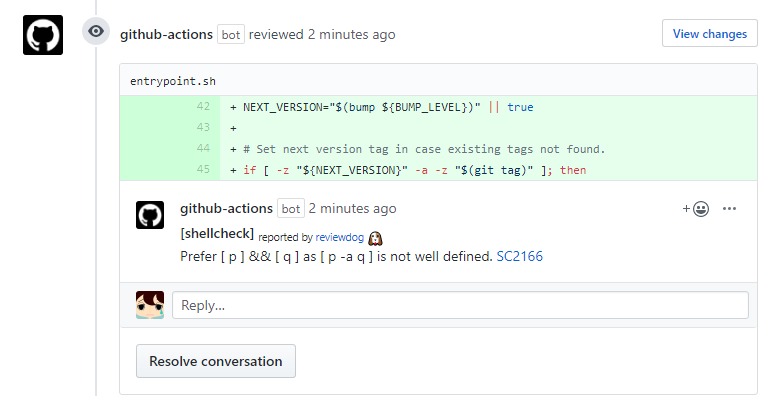Run sqlfluff with reviewdog
ActionsTags
(2)This is a github action to lint and fix SQL with sqlfluff.
The action has the two modes corresponding to sqlfluff lint and sqlfluff fix.
One is to automatically leaves comments about SQL violation using reviewdog
The other is to automatically suggests code formatting on github pull request with reviewdog too.
The lint mode leaves comments on github pull requests.
Comments are pointed out by sqlfluff.

The fix mode suggests code formatting based on sqlfluff fix.

name: sqlfluff with reviewdog
on:
pull_request:
jobs:
test-check:
name: runner / sqlfluff (github-check)
runs-on: ubuntu-latest
steps:
- uses: actions/checkout@v4
- uses: yu-iskw/action-sqlfluff@v4
id: lint-sql
with:
github_token: ${{ secrets.github_token }}
reporter: github-pr-review
sqlfluff_version: "3.2.5"
sqlfluff_command: "fix" # Or "lint"
config: "${{ github.workspace }}/.sqlfluff"
paths: "${{ github.workspace }}/models"
- name: "Show outputs (Optional)"
shell: bash
run: |
echo '${{ steps.lint-sql.outputs.sqlfluff-results }}' | jq -r '.'
echo '${{ steps.lint-sql.outputs.sqlfluff-results-rdjson }}' | jq -r '.'inputs:
github_token:
description: "GITHUB_TOKEN"
required: true
default: "${{ github.token }}"
github_base_ref:
description: "Pull request target branch name"
required: false
default: "${{ github.base_ref }}"
working-directory:
description: "working directory"
required: false
default: "${{ github.workspace }}"
### Flags for reviewdog ###
level:
description: "Report level for reviewdog [info,warning,error]"
required: false
default: "error"
reporter:
description: "Reporter of reviewdog command [github-check,github-pr-review]."
required: false
default: "github-check"
filter_mode:
description: |
Filtering mode for the reviewdog command [added,diff_context,file,nofilter].
Default is file.
required: false
default: "file"
fail_on_error:
description: |
Exit code for reviewdog when errors are found [true,false]
Default is `false`.
required: false
default: "false"
reviewdog_version:
description: "reviewdog version"
required: false
default: "v0.20.2"
### Flags for sqlfluff ###
sqlfluff_version:
description: |
sqlfluff version. Use the latest version if not set.
required: false
default: "3.2.5"
sqlfluff_command:
description: "The sub command of sqlfluff. One of lint and fix"
required: false
default: "lint"
paths:
description: |
PATH is the path to a sql file or directory to lint.
This can be either a file ('path/to/file.sql'), a path ('directory/of/sql/files'), a single ('-') character to indicate reading from *stdin* or a dot/blank ('.'/' ') which will be interpreted like passing the current working directory as a path argument.
required: true
file_pattern:
description: "The regular expression to filter checked files"
required: false
default: '\.sql$'
encoding:
description: "Specifiy encoding to use when reading and writing files. Defaults to autodetect."
required: false
default: ""
config:
description: |
Include additional config file.
By default the config is generated from the standard configuration files described in the documentation.
This argument allows you to specify an additional configuration file that overrides the standard configuration files.
N.B. cfg format is required.
required: false
default: ""
exclude-rules:
description: |
Exclude specific rules.
For example specifying –exclude-rules L001 will remove rule L001 (Unnecessary trailing whitespace) from the set of considered rules.
This could either be the allowlist, or the general set if there is no specific allowlist.
Multiple rules can be specified with commas e.g. –exclude-rules L001,L002 will exclude violations of rule L001 and rule L002.
required: false
default: ""
rules:
description: |
Narrow the search to only specific rules.
For example specifying –rules L001 will only search for rule L001 (Unnecessary trailing whitespace).
Multiple rules can be specified with commas e.g. –rules L001,L002 will specify only looking for violations of rule L001 and rule L002.
required: false
default: ""
templater:
description: "The templater to use"
required: false
default: ""
disable-noqa:
description: "Set this flag to ignore inline noqa comments."
required: false
default: ""
dialect:
description: "The dialect of SQL to lint"
required: false
default: ""
processes:
description: "The number of parallel processes to run."
required: false
default: "2"
extra_requirements_txt:
description: |
A path to your custom `requirements.txt` to install extra modules for your dbt adapters.
Please make sure not to contain `sqlfluff` and its dependent packages, because the action can be broken by the conflicts.
required: false
default: ""The outputs are available only when the sqlfluff_command input is lint.
outputs:
sqlfluff-results:
description: "The JSON object string of sqlfluff results"
value: ${{ steps.sqlfluff-with-reviewdog-in-composite.outputs.sqlfluff-results }}
sqlfluff-exit-code:
description: "The exit code of sqlfluff"
value: ${{ steps.sqlfluff-with-reviewdog-in-composite.outputs.sqlfluff-exit-code }}
sqlfluff-results-rdjson:
description: "The JSON object string of sqlfluff results"
value: ${{ steps.sqlfluff-with-reviewdog-in-composite.outputs.sqlfluff-results-rdjson }}
reviewdog-return-code:
description: "The exit code of reviewdog"
value: ${{ steps.sqlfluff-with-reviewdog-in-composite.outputs.reviewdog-return-code }}You can bump version on merging Pull Requests with specific labels (bump:major,bump:minor,bump:patch). Pushing tag manually by yourself also work.
This action updates major/minor release tags on a tag push. e.g. Update v1 and v1.2 tag when released v1.2.3. ref: https://help.github.com/en/articles/about-actions#versioning-your-action
This reviewdog action template itself is integrated with reviewdog to run lints which is useful for Docker container based actions.
Supported linters:
This repository uses reviewdog/action-depup to update reviewdog version.
|
Yu Ishikawa |
Chris Kruger |
Dreamsome |
Snyk Bot |
Null |
Run sqlfluff with reviewdog is not certified by GitHub. It is provided by a third-party and is governed by separate terms of service, privacy policy, and support documentation.



